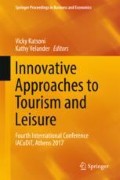Abstract
This paper presents a case study of sustainable tourism practices in Costa Rica, including national initiatives that promote sustainability and examples of rural tourism as experienced through study abroad. Costa Rica is known as a world leader in sustainable tourism practices. After widespread rainforest deforestation, and exploitation by foreign developers, Costa Ricans have grown increasingly aware of the importance of protecting their natural resources. Subsequently, national legislation and policies have been developed to support sustainable practices. The Ley de Biodiversidad conserves biodiversity in natural areas (see http://www.wipo.int/wipolex/en/details.jsp?id=896). The Certificación para la Sostenibilidad Turística encourages businesses to use sustainable practices by awarding leaves instead of stars for meeting environmental standards (see http://www.turismo-sostenible.co.cr/). The Programa Bandera Azul Ecologica protects the water quality of beaches, coastal areas, and tourist accommodations (see http://banderaazulecologica.org/). A crucial dimension of sustainable tourism in Costa Rica is consideration for the social, economic, and cultural wellbeing of community members. This paper shares the work of José Rogelio Vargas and Susana Matamoros Mendoza who train local community members living near protected areas to become sustainable tourism entrepreneurs. Businesses include lodges, restaurants, tours, and outdoor pursuits. With a focus on empowerment, their efforts aim to improve the quality of life and economic viability of rural communities while conserving surrounding natural resources. This paper also features a course in sustainable tourism at Ithaca College, which includes study abroad in Costa Rica that supports the entrepreneurs. Students learn about sustainable tourism by talking directly with tour operators. They stay in locally run ecolodges, eat locally grown food, and engage in recreational activities led by local guides (e.g., hiking, kayaking, chocolate tour). Students also study the sustainable methods entrepreneurs use (e.g., alternative energy, recycling, community partnerships). While students learn about sustainable tourism, they support the communities that are actually engaged in the enterprise.
Access this chapter
Tax calculation will be finalised at checkout
Purchases are for personal use only
Author information
Authors and Affiliations
Corresponding author
Editor information
Editors and Affiliations
Rights and permissions
Copyright information
© 2018 Springer International Publishing AG
About this paper
Cite this paper
Heyne, L., Vargas, J.R., Matamoros Mendoza, S. (2018). Sustainable Tourism in Costa Rica: Supporting Rural Communities Through Study Abroad. In: Katsoni, V., Velander, K. (eds) Innovative Approaches to Tourism and Leisure. Springer Proceedings in Business and Economics. Springer, Cham. https://doi.org/10.1007/978-3-319-67603-6_23
Download citation
DOI: https://doi.org/10.1007/978-3-319-67603-6_23
Published:
Publisher Name: Springer, Cham
Print ISBN: 978-3-319-67602-9
Online ISBN: 978-3-319-67603-6
eBook Packages: Business and ManagementBusiness and Management (R0)

